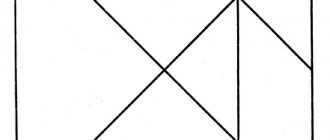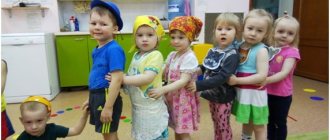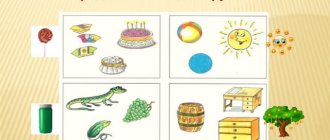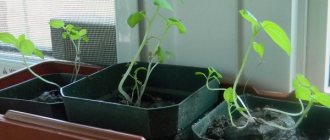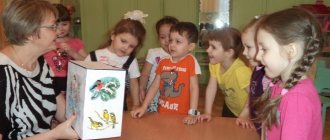Maria Malakhova
Didactic game
"
Vegetable garden "
.
For children of primary preschool age. Goal: - learn to determine the spatial arrangement of objects; clarify children’s knowledge about vegetables, where they grow, and their benefits to humans;
Learn to distinguish vegetables by appearance, describe them by their characteristic features;
Learn to use the general concept “Vegetables”
, enrich vocabulary by denoting qualities;
Develop attention, memory, perseverance, coordination of movements, fine motor skills of the hands.
Progress of the game: Children are given fruits and vegetables. They must distribute where the fruits grow and where the vegetables grow. While completing the task, children consolidate the names of vegetables.
Progress of the game: A garden is drawn on one album sheet, a vegetable garden on the other.
Nearby lie vegetables and fruits cut out of paper and colored with colored pencil.
Children distribute vegetables and fruits where they grow.
Publications on the topic:
Preschool children love to play with small toys. Therefore, they like to “plant” knitted vegetables in beds and knitted fruits.
DIY didactic game. To create this game, I made a layout on which I depicted a forest on one side and a forest on the other.
The game is made from an ordinary box covered with thick green fabric. A house is made from planks and glue. Decorative elements are used.
Games with food have always been interesting to children as such. Role-playing games in the “shop”, “vegetable garden”, “kitchen” are simply irreplaceable for girls.
DIDACTIC GAME “GIFTS FROM BURENKA!” Printed board game for children 4-5 years old TYPE OF GAME Cognitive orientation.
When working with children to develop fine motor skills, teach dialogical speech, and sensory education, you can use the following substitute items.
Summary of GCD for speech development. Didactic game for pronunciation of sounds [M]-[M'], [B]-[B']. Didactic game “Who left?” Goal: development of the articulatory apparatus. Objectives: 1. To develop the ability to clearly pronounce the sounds mm, b-b in sound combinations, to distinguish.
Dear Colleagues! In the nature center I placed a game for children of the second junior group “Vegetable Garden”, in the form of a model of a vegetable garden. The beds are made of centipon.
Abstract of the educational activity "Journey to the spring garden" of the workshop "Garden and Vegetable Garden" with children of the first junior group.
On the topic: methodological developments, presentations and notes
The main functions of a didactic game. A didactic game is a multifaceted, complex pedagogical phenomenon: it is both a game method of teaching preschool children and advanced.
The purpose and objectives of the musical game, Important aspects, Groups, forms of games.
An article for parents on musical education of preschool children.
Goal: to consolidate children’s knowledge about vegetables, clarify their name, color, shape, teach them to distinguish by appearance; expand the understanding of growing vegetable crops; develop observation and lu.
Expand your understanding of growing vegetables.
Expand your understanding of growing vegetables.
Source
Didactic game "Vegetable garden"
Yana Romanchenko
Didactic game "Vegetable garden"
Games with food have always been interesting to children as such. Role-playing games in the “shop”, “ vegetable garden” , “kitchen” are simply irreplaceable for both girls and boys.
Integration of educational areas: “Cognition”
,
"Communication"
,
"Health"
.
The manual consists of six knitted dummies of vegetables (carrots, beets, cabbage)
Goal: to expand and clarify children's knowledge about vegetables.
Task:1) Consolidate knowledge about vegetables. 2) To develop the ability to distinguish vegetables by shape and color. 3) To develop children’s interest in the plant world, to develop cognitive activity and communication skills during joint games.
It’s very interesting to play , firstly, pleasant materials that perfectly stimulate the child’s tactile sensations and secondly, during the game the child generalizes and refines his knowledge about vegetables, where they grow, and their benefits for humans.
The kids can be allowed to play at their own discretion , i.e., whatever they want, they “sit in.” You can also set tasks to develop spatial thinking, for example: “Plant the carrots in the upper right corner and the cabbage in the lower right.” Thanks to the game, you can develop interactive speech in children, for example: “What color are carrots? What about beets?
There are many analogues on the Internet, I ended up with this cheerful vegetable garden )
Didactic game “What is harmful, what is useful” and didactic game “Dangerous and safe objects” Didactic game “What is harmful, what is useful” Purpose. To consolidate children's knowledge about harmful and beneficial phenomena and objects. Develop the ability to explain. Didactic game for children of senior preschool age. Printed board game “Make a story from a picture” Printed board game “Make a story from a picture” (This game can be used as additional material for development classes. Do-it-yourself didactic game for kindergarten “Garden and Vegetable Garden”. Master class Didactic The game "Garden and vegetable garden?" is intended for young children to consolidate knowledge about fruits and vegetables. Purpose: consolidation. Didactic game for FEMP "Fun vegetable garden" Didactic game for FEMP "Fun vegetable garden" Age: middle group Goal: to develop children's ability to count objects, fix the numbers within. Didactic game “Fold the picture.” Educational game “Draw with rubber bands” Objectives: to help children develop visual perception, voluntary attention, memory and imaginative thinking, as well as consolidate the names of colors. Didactic game “Sound - letters” ( author's game) Didactic game "Sound - letters" Purpose: To teach children to conduct a sound analysis of words, isolate word stress. To consolidate the ability to identify.
Drama lesson summary Pantomime game “The hare had a garden” Technological map of organized educational activities No. 1 Educational area: Communication Section: Drama Topic: Pantomime game “There was.
"Vegetable garden on the window." Project “Merry Vegetable Garden” in the middle group Relevance of the project topic: the project is aimed at expanding and generalizing knowledge about cultivated garden plants of the Azov region, so...
Source
My kindergarten
Author: Lyamina Natalya Yurievna , teacher, Municipal budget preschool educational institution of compensatory type N76 “Veterok”, Republic of Tatarstan, Naberezhnye Chelny.
Children line up around the perimeter of the playground.
Host: Guys! Today is an unusual day, hot, summer. We celebrate gardener's day. Since ancient times, all people have worked on the land - planting seeds, digging the ground, watering plants. And for all their labors, Mother Earth gave them a harvest (vegetables, fruits, berries). Let's celebrate the holiday with a cheerful song.
Song "Merry Garden"
Summer enters. Summer: Hello, boys, girls and boys! So the sun woke up, stretched, smiled, invites all the children to go for a walk, and play on the grass!
Host: Hello, summer! Hello summer! Everything is warmed by the bright sun! Let's take a look into the garden, guys. Oh, nothing grows there! Let's plant a garden together.
Game “Planting a Vegetable Garden”
We took shovels and imitated the movements of the beds. They took the rake in hand and leveled the ground. They took watering cans in their hands and watered the beds. The garden has grown and grown!
Host: Guys, what grows in the garden? (vegetables) Correct. What is needed for vegetables to grow? Let's call the rain for help, guys.
Call: Rain, rain, harder, you are our vegetable garden!
Rain comes in. Rain: Hello guys, I’ll help you, I’ll wake up your beds. Let many plants grow in your garden. Let's play a game with you.
Game “Rain, have fun!”
Rain, rain, have fun! Hit your palm with your finger. Drip, drip, don't be sorry! Just don’t kill us by threatening us with your index finger. Don't knock on the window in vain! It’s better to splash it in the garden - “Inviting” hand movements. Let the carrots grow there. Smoothly extend your arms to the sides.
Presenter: Rain, the guys and I know a song about you, listen.
Song “Rain” (in Tatar)
Rain: Well done, guys, what a beautiful, melodious song. The cheerful, mischievous rain came to the garden with me: I hold the rain cloud by the hand.
Song "Tuchka"
Summer: Guys, what else is needed for the vegetables in the garden to grow large, tasty and rosy? (Sun). I suggest you sing a song about the sun.
Song “About the Sun” (in Tatar).
Summer: The rain watered the earth, the sun warmed up. And there are a lot of ripened vegetables in the beds. Guys, what is growing in the garden?
Guess the riddles:
- The red maiden sits in prison, and her braid is on the street. (carrot)
- As I put on a hundred shirts, it crunched in my teeth. (cabbage)
- The grandfather is sitting, dressed in a fur coat, and whoever undresses him sheds tears. (onion)
- In the middle of the courtyard is the Golden Head. (sunflower)
- Our piglets grew up in the garden bed sideways to the sun, with crocheted tails. These little pigs are playing hide and seek with us. (cucumbers)
- Little, bitter brother of Luka. (garlic)
Rain: You guys are bored. Let's have fun and play.
Game “The Bunny Had a Garden”
The bunny had a vegetable garden and spread his arms to the sides. There are exactly two beds. Extend your arms straight forward. There he played snowballs in the winter, imitating “making snowballs”, and in the summer - hide and seek. They squat, covering their eyes with their palms. And in the spring they go to the garden on the spot. The bunny walks happily. But first, everything will be dug up. They imitate digging. And then everything is leveled, they stomp their feet. He sows the seeds deftly, presses his left hand to his chest, and goes to plant carrots. With the right hand they “scatter seeds” Hole – seed, hole – seed, Bend forward. And you look, in the garden again Slowly they raise their hands up, Peas and carrots will grow. Palms parallel to the floor. And when autumn approaches, they spread their arms to the sides. He will reap his harvest. Press your palms to your chest.
Round dance "Garden round dance"
In the garden, in the vegetable garden We walked merrily, In the garden, in the vegetable garden We dug up beds. The seeds were planted in the garden bed, they were lowered into the hole, and then the garden bed was watered with warm water. You grow up quickly, carrot! We will weed the garden bed, the warm rain will fall on you, on the field.
Host: Guys, look how many birds fly in the garden. In order for our vegetables in the beds to grow large, strong, tasty and juicy, so that they are healthy and contain a lot of vitamins, birds should not peck them. Who will scare away the birds? (garden scarecrow).
A garden scarecrow is dressed up in front of the children: the presenter and the characters put a shirt, trousers, and tie on a stick, and a wig and hat are put on the head.
Presenter: This is how beautiful the owner of our garden turned out, he will protect our garden from birds. Let’s go with you to the garden and put up a garden scarecrow.
The presenter and the children install the garden scarecrow in the designated place. (to the garden bed)
At the end of the holiday, children are given treats (fruits).
Fun music is playing, children are having fun with the characters.
Didactic game for repetition of the Tatar language “Bar matur bakcha. Beautiful vegetable garden"
Anna Baretskaya
Didactic game for repetition of the Tatar language “Bar matur bakcha. Beautiful vegetable garden"
Municipal autonomous preschool educational institution
"Kindergarten No. 97 combined type"
Moskovsky district of Kazan
Author: teacher of MADOU No. 97
Baretskaya Anna Sergeevna
Goal: To systematize children’s knowledge on the topics “Minem eat” (“My home”, “Yashelchlr m imeshlr” (“Vegetables and fruits”)
.
Educational: to intensify the monologue and dialogic speech of children in two state languages - Russian and Tatar ;
Developmental: develop the ability to master and transform the surrounding space, children's interest in play and speech activities; development of fine motor skills.
Educational: to cultivate interest in learning the Tatar language , the desire to know it.
This manual can be used by the teacher to reinforce words on these topics, and children can also play independently . These games will not bore your child and will make learning interesting and educational.
Material: carpet, construction house, cards with a picture of a family; a set of fruits and vegetables cut out of hard felt. Using tape (Velcro, buttons, glued and sewn on the back side), fruits are attached to the tree, and vegetables to the bed; tree and bed, basket.
A game for children of middle and senior preschool age, depending on the variability of the game.
There can be from two to six people playing
Progress of the game: Children are invited to assemble a house from parts cut out of felt, and “plant” a garden and a vegetable garden.
Game option 1: “Yig Chakyr” (“Invite into the house”)
The teacher asks to answer the question: By whom?
(Who is this)
Children's answer: Bu ni - this is mom, etc. and invite them into the house, for example: ni kiel monda - mom, come here. Same with all family members. Whoever gives the most correct answers wins.
Option 2 of the game: “Uyshny y, sana” (“Collect and count the harvest”)
.Children answer the questions: “Bu nrs?”
("What's this?")
;
“Nindy?” ("Which)
;
“Nothing?” ("How many?")
.
The winner is the one who correctly answers the questions and counts vegetables and fruits in the Tatar language .
Game option 3: “Tslrne address it” (“Name the color correctly”)
.
Children name the color of objects in Tatar . Whoever names the most objects by color wins.
Summary of the lesson “Vegetable garden” Purpose: to consolidate children’s knowledge about the characteristic properties of vegetables and fruits (shape, color, taste, surface features); clarify who and where.
Do-it-yourself didactic game for kindergarten “Garden and Vegetable Garden.” Master class Didactic game “Garden and vegetable garden?” Designed for young children to consolidate knowledge about fruits and vegetables. Goal: consolidation. Didactic game for sensory development of children 2–3 years old “Zaikin’s garden”. Master class with step-by-step photos Description of the material: this master class shows the process of making a didactic game for the sensory development of children 2-3 years old. Didactic game “On the way to kindergarten” DIDACTIC GAME “ON THE WAY TO KINDERGARTEN” Revyakina Olga Konstantinovna Teacher of the speech therapy group Relevance: educate. Didactic game based on FEMP “Merry Garden” Didactic game based on FEMP “Merry Garden” Age: middle group Goal: to develop children’s ability to count objects, to consolidate numbers within limits. Didactic game "Merry vegetable garden" or sewn utilities Didactic game "Merry vegetable garden". This game can be used in working with children of primary preschool age in classes. Design of the site “Our garden and vegetable garden” Good afternoon, dear friends! The weather is wonderful outside, it’s summer, which means we’re planting, growing, and watering everything. This year my parents and I...
Organized educational activities for learning the Tatar language at special moments in the middle group. Summary of the special moment for teaching children the Tatar language according to the project of the educational complex “Minem Em” in the middle group. Consolidation of vocabulary.
Russian language lesson. Grade 5 “Repetition, generalization of material on the topic “Adjective. World of Art” Topic: Repetition, generalization of material on the topic “Adjective”. "World of Art". Goals and objectives of the lesson: 1. Repeat, consolidate what has been learned.
Source
Didactic game “Plant a vegetable garden”
Tatyana Gennadievna Tikhonova
Didactic game “Plant a vegetable garden”
Didactic games help children consolidate the knowledge gained in classes, excursions, while watching cartoons and videos, etc. I bring to your attention the didactic game “ Plant a Vegetable Garden ”. I made this game with my own hands. In our kindergarten there was a competition of didactic games based on Wenger . All groups took an active part.
The game consists of two types of cards. The cards are divided into four parts.
Some cards have yellow and green circles glued on them.
I cut out silhouettes of cucumbers and turnips from cardboard, painted them and varnished them.
At first, it is difficult for children to lay out the image correctly, but with experience comes skill.
I think many people have such a game , but I made this game with my own hands.
We have a vegetable garden that doesn’t grow in the window.
play it , we develop our minds.
Campaign “Plant a Tree” Campaign “Plant a Tree” Prepared by teacher Karasteleva Svetlana Anatolyevna In the kindergarten “Yagodka”, in October 2016, it took place.
Author's didactic game on environmental education "Plant a forest" for children of the middle group Author's didactic game on environmental education "Plant a forest" for children of the middle group The game is designed for middle-aged children.
Didactic game “What is harmful, what is useful” and didactic game “Dangerous and safe objects” Didactic game “What is harmful, what is useful” Purpose. To consolidate children's knowledge about harmful and beneficial phenomena and objects. Develop the ability to explain. Didactic game for children of senior preschool age. Printed board game “Make a story from a picture” Printed board game “Make a story from a picture” (This game can be used as additional material for development classes. Do-it-yourself didactic game for kindergarten “Garden and Vegetable Garden”. Master class Didactic The game "Garden and vegetable garden?" is intended for young children to consolidate knowledge about fruits and vegetables. Purpose: consolidation. Didactic game "Vegetable Garden" Games with food have always been interesting to children as such. Thematic role-playing games in "shop", "vegetable garden" ", "kitchen" are simply irreplaceable for girls. Didactic game for FEMP "Merry Garden" Didactic game for FEMP "Merry Garden" Age: middle group Goal: to develop children's ability to count objects, consolidate numbers within limits. Didactic game "Sound - letters" (author's game) Didactic game "Sound - letters" Purpose: To teach children to conduct a sound analysis of words, to isolate word stress. To consolidate the ability to identify.
Source



